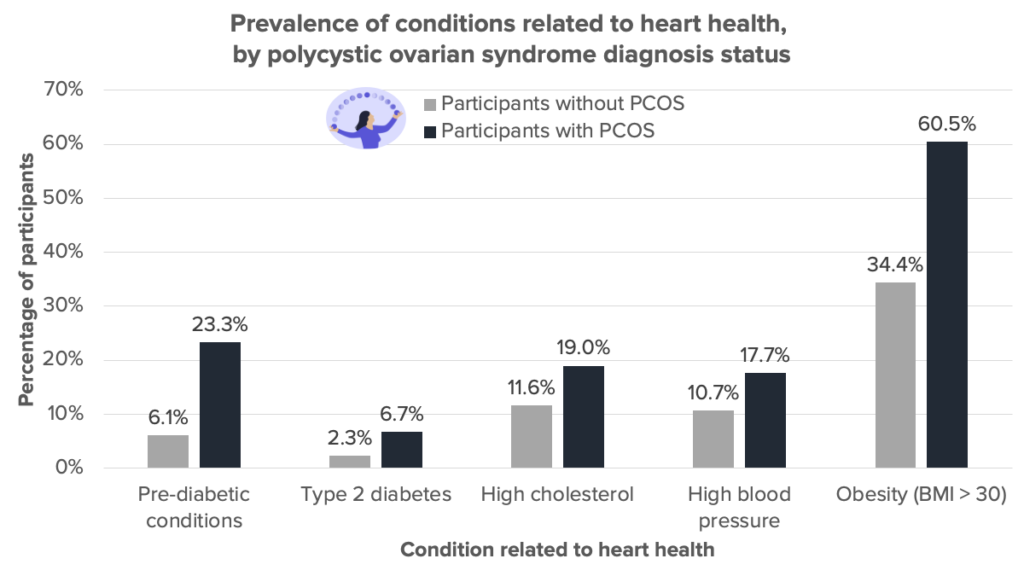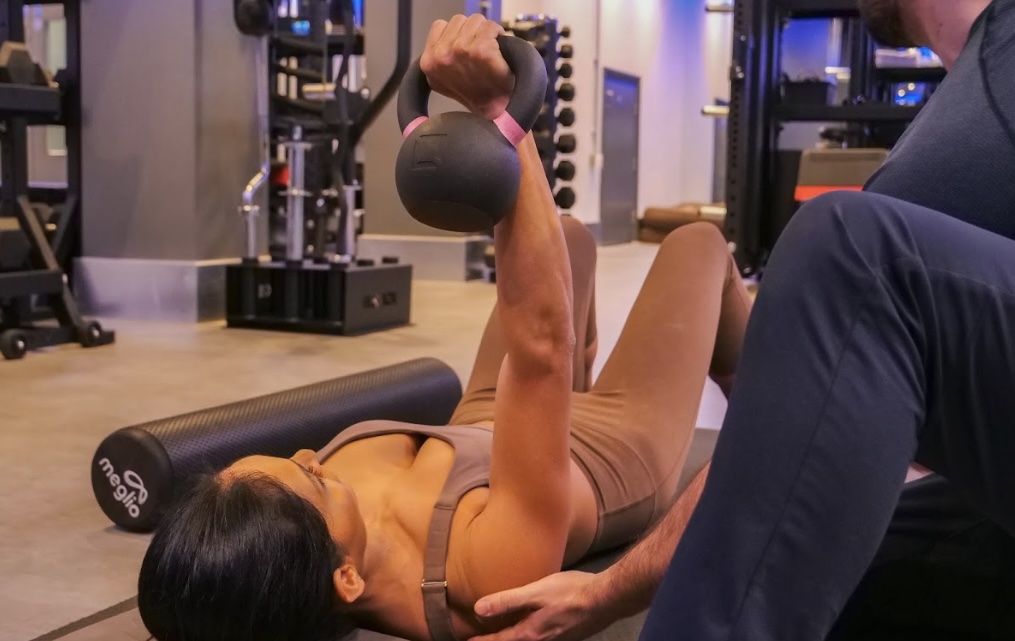Polycystic Ovary Syndrome (PCOS) is a type of health condition referred to as an endocrine disorder – which, in simple terms, means it is an issue that affects significant parts of the hormone system.
While an impact on a person’s menstrual cycles is a commonly-known symptom of PCOS, the condition isn’t just linked to a person’s reproductive health – it has a series of other symptoms, as well as potentially contributing to serious health risks – including insulin resistance, type 2 diabetes, heart disease, and mental health challenges.
While you may imagine our personal trainers are more focused on helping people change what they see when they look in the mirror, our expertise actually runs much deeper than that. Having helped numerous personal training clients use exercise to counteract the symptoms of PCOS, we felt well placed to put together a blog that explains how exercise can help with Polycystic Ovary Syndrome, what science says about exercise and PCOS, and the different types of exercise that many people find helpful.
(Spoiler alert – there are no crash diets or over-the-top intense workout plans involved!)
Understanding PCOS
Polycystic Ovary Syndrome (PCOS) is a complex endocrine disorder affecting approximately 10% of women of reproductive age, making it one of the most common hormonal disorders in this group. Characterized by a combination of symptoms, the main features of PCOS include irregular menstrual periods, excess androgen levels (male hormones typically present in women in small amounts), and polycystic ovaries, where the ovaries may develop numerous small collections of fluid (follicles) and fail to regularly release eggs.

The implications of PCOS go beyond reproductive health, contributing to several long-term health complications. Insulin resistance is a central issue, with many affected individuals developing a decreased ability to use insulin effectively, leading to an increased risk of developing type 2 diabetes.
PCOS is also associated with obesity, a factor that exacerbates other symptoms and risks, including the development of cardiovascular disease due to increased LDL (bad) cholesterol levels and high blood pressure. These interconnected health concerns underscore the importance of comprehensive management strategies, including lifestyle interventions, to mitigate these risks and improve the quality of life for women living with PCOS.
The Importance of Exercise in Managing PCOS
Exercise plays a really significant role in managing Polycystic Ovary Syndrome (PCOS) – by addressing both symptoms and associated health risks directly linked to the condition.
Regular physical activity helps manage weight, which is a crucial factor since weight loss can significantly reduce PCOS symptoms and lower the risk of developing further health complications.

What’s more, engaging in consistent exercise improves insulin sensitivity, which is especially beneficial given the insulin resistance often seen in individuals with PCOS. Improved insulin sensitivity can lead to better blood sugar control, reducing the risk of type 2 diabetes. Exercise also contributes to hormonal balance, helping to lower levels of androgens (male hormones that are typically elevated in PCOS) and increase levels of SHBG (sex hormone-binding globulin), which binds excess hormones.
This hormonal regulation can lead to more regular menstrual cycles and alleviate some of the symptoms associated with PCOS, such as acne and hair growth. Incorporating a mix of aerobic, strength training, and flexibility exercises can offer the most comprehensive benefits for managing PCOS effectively.
Exercise Tips and Precautions for Women with PCOS
If you’re thinking about exercising to combat the symptoms of PCOS, it can be useful to start by talking to your doctor. Typically, a doctor or specialist will follow the NHS guidelines around PCOS, which, along with the possibility of medications, will start with lifestyle changes.
According to NHS guidelines, “weight loss” of around 5% can lead to a significant improvement in PCOS. Now, it’s fair to say that not all weight loss is equal – and it’s likely that the term “weight loss” in this context is actually being used to describe fat loss. This is an area where our expertise really comes into play – not least because the goal of losing fat is the most common reason people come to Fitness Lab.
Fat Loss Doesn’t Have to Be Torture!
If you’re of the opinion that fat loss isn’t easy – you’re not alone. Modern life makes it difficult to reduce the amount of fat a person carries – and that’s before you factor in the symptoms of PCOS that can make fat loss even trickier. The thing is, many approaches to fat loss make the journey unnecessarily difficult – especially if you’re looking at very restrictive diet plans (we’re looking at you keto diet!), super-intense workouts (we see you daily spin classes!) – but we take a different approach.

At Fitness Lab, we will generally structure a program for someone with PCOS around “resistance training” principles. While cardio exercises can be fantastic, they tend to begin and end in the gym – i.e., if you burn a few hundred calories in a class, that’s it until you’re back in the gym next time. Resistance training works differently though – when you push, pull, squat, lift, and perform other movements that get your muscles working, you’re inspiring growth in those muscles. This growth requires calories for a long time after your workout session – so you turn your body into a more effective calorie-burning machine, therefore reducing the number of calories that become stored as fat.
Oh, and if you’re thinking about resistance training and getting worried about becoming bulky or building too much muscle – don’t be. Even if PCOS means you produce excess androgen, you’d have to commit countless hours every day in the gym and consume an extremely high number of calories every day over many years if you wanted to look like someone from the new Gladiators series. Of course, we can help you work towards that if you like – but resistance training at the level we’re talking about here is going to lead to a more toned body – not bulging biceps.
Focus on a Series of Easy Wins (and People Who’ll Support You)
Of course, it’s not just kettlebells and weights that will help with PCOS; there are a series of other fitness-related lifestyle changes that will help too. The good news is, a great personal trainer will also be able to help you with these things.
Firstly, there’s rest to think about. Remember we mentioned that resistance training turns your body into a more efficient calorie-burning machine? Well, that machine benefits enormously from proper rest. The amount of sleep a person needs depends on a lot of different factors – but a good personal trainer will be able to help you with working this out – including what ‘rest days’ look like, the kinds of things you can be doing for ‘active rest’ – and also how to make sure the sleep you get is the best it can be.
There’s also nutrition to think about. Don’t panic when you read this – we’re not advocates for completely turning your diet on its head when you work with a Fitness Lab personal trainer! Health guidance recommends focusing on adjusting your diet to include more whole foods as an effective way to boost your overall health. As such, we’ll help you look at food in a slightly different way – thinking about problem foods that are linked to PCOS, possible substitutes for those things, and how to monitor your food intake to make sure you’re in control and supporting the work you’re doing in our studios.
How Quickly Will You See Changes?
Manageable and realistic changes are the ones that stick – and when you continue to build on these helpful new habits, you’ll be amazed at how quickly you feel different. And, needless to say, your PT will be beside you with every step should you wish. We’re more than happy to help you put together goals for outside our studios, perhaps relating to what different lunch options could look like, a good number of steps to aim for each day – and so on.
It’s unlikely that you’ll be able to snap your fingers and immediately change your mindset around health in a way that instantly changes your PCOS symptoms. However, when you start building on these small but noticeable changes to your health, there’s a strong possibility that you’ll also start to see lasting changes in your PCOS symptoms.
Effective Exercise Strategies for PCOS
For people with Polycystic Ovary Syndrome (PCOS), incorporating a mix of aerobic exercises, strength training, and flexibility or mind-body practices is found to offer significant benefits in managing symptoms and improving overall health.
Aerobic Exercises

Engaging in regular cardiovascular activities such as walking, jogging, or cycling can significantly enhance heart health and aid in weight management. These forms of exercise help burn calories and reduce body fat, which is particularly beneficial since weight loss can improve insulin sensitivity and help regulate menstrual cycles.
Typically, these would be things we talked to you about incorporating into life outside of our studios – and we’re always happy to help you plan.
Strength Training

Resistance exercises not only build muscle mass but also boost metabolism, contributing to more effective weight management. Increasing muscle mass has the added benefit of improving insulin sensitivity, as muscles consume glucose for energy, thereby lowering blood sugar levels.
Our private studios and dedicated ‘pod’ space means this kind of resistance training is really practical to do in your Fitness Lab sessions. Naturally, you’ll have a dedicated PT by your side when you do.
Flexibility and Mind-Body Practices

Yoga and Pilates can be especially beneficial for people with PCOS. These practices not only improve flexibility and core strength but also focus on stress reduction and mental well-being. The hormonal balance in PCOS can be adversely affected by stress, making stress-reducing exercises an important part of symptom management.
By integrating these diverse exercise strategies, people with PCOS can tackle the syndrome from multiple angles, promoting better health outcomes and enhancing their quality of life.
With coaches who understand Pilates at Fitness Lab, we’re able to help you build Pilates principles into what you do in the gym – as well as guiding you around workouts and exercises you can do at home too.
Polycystic Ovary Syndrome (PCOS) and Exercise – A Summary
Polycystic Ovary Syndrome (PCOS) is a condition that affects millions of people in the UK – and it’s highly likely that many people are living with the condition without realising it.
Exercise can be enormously helpful in easing the symptoms you’re dealing with – a fact that is acknowledged by doctors and the NHS as a whole. Resistance training, supported by some aerobic activity, some manageable nutritional adjustments, and making sure you get a good level of rest are all very effective ways of creating a stronger, healthier, and more balanced version of you – and, in turn, they’re all things that will help to counter the symptoms you’re facing.
Of course, with any health challenge and steps taken to ease the symptoms, support is absolutely essential. Working with a PT who can offer this support can be the difference between making progress or slipping back into old habits. Taking time to find a personal trainer or personal training service that takes the time to listen to you, understand the challenges you’re facing, then apply expert knowledge in a manageable way is absolutely key.

